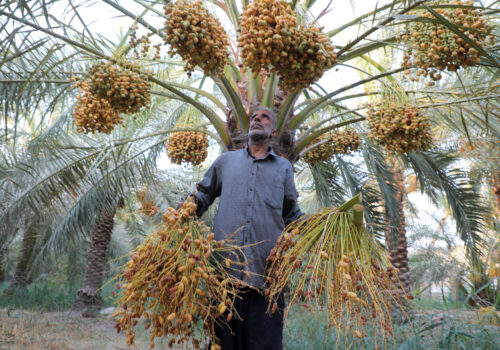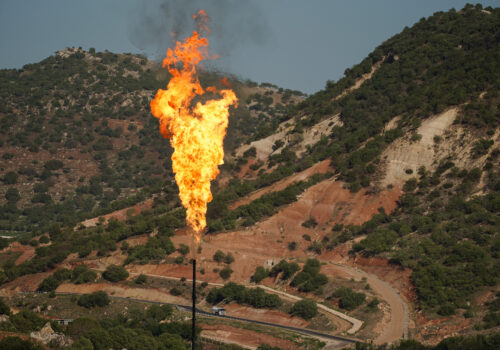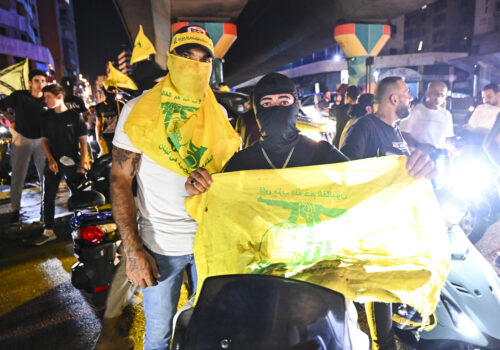Can Iraq’s partial crackdown on a powerful militia weaken Iran’s proxies?
The Iraqi government’s unprecedented accusation that the US-designated Kataib Hezbollah (KH) carried out a deadly armed attack on a government office represents a move that could weaken the most disciplined and feared pro-Iran militia in Iraq.
On August 8, a few days after the attack, Baghdad announced that the perpetrators of the July attack on the Agriculture Directorate in Western Baghdad “are part of KH, belonging to the two Hashd brigades forty-five and forty-six.” According to the official statement, the attack, which killed two people, including a KH member, and wounded fifteen, was meant to prevent the installation of a newly appointed director, replacing the outgoing pro-KH corrupted director.
Successive governments in Iraq have publicly maintained a distinction between “resistance groups”, including KH, and the Popular Mobilization Units (PMUs, aka Hashd). Groups like KH have been more “tolerated” as ideological forces outside government control. At the same time, the Hashd supposedly follows official orders. This distinction stems from the Hashd’s 2014 founding as a de facto state-sponsored military force—essentially a militia—came through an unconstitutional executive order by the prime minister. This was later legalized through a 2016 act of parliament as the constitution stipulates, making the Hashd an official part of the Iraqi armed forces. Although laughably unconvincing, the distinction served a purpose for Baghdad: avoiding the responsibility to rein in the Hashd, while indirectly blaming “the resistance groups” for all the misdeeds committed by it.
The government committee overseeing the investigation of the July attack recommended dismissing the commanders of the two accused brigades, forty-five and forty-six, on concerns that “there is something wrong in the command and control of Hashd Shaabi, including the existence of formations that do not follow military instructions.” As the commander-in-chief, Mohammed Shiaa al-Sudani approved the recommendation, per the statement.
Al-Sudani government’s willingness to face down KH—the strongest and most ideological pro-Iran militia in Iraq, repeatedly bombed by the United States for targeting and killing US personnel—is a rare and daring move. It exposed KH’s presence within Hashd, accusing it of corrupt and criminal activities. Still, the government’s resolve will be further tested in fulfilling its promise to prosecute a judicial case against the KH perpetrators.
Al-Sudani’s calculations
Al-Sudani’s actions against KH are bold and calculated, apparently with two goals in mind. The first is electoral politics. Al-Sudani has launched the “Reconstruction and Development Coalition” to challenge, in the upcoming November general election, the Coordination Framework (CF)—the current Shia parliamentary bloc that installed him as a prime minister in 2022, but largely opposes him now for a second term. Iraqi Shias are frustrated with the CF’s corrupted practices, and al-Sudani wants to capitalize on the widespread anger at the militias’ mafia-like theft that routinely goes unpunished. Here, the government’s non-political framing of its case against KH, whose political party Harakat Haquq is part of the CF, is noteworthy: a simple fight against corruption. The dismissed director that KH sought to reinstall is accused of forging official documents to transfer agricultural lands, reportedly for KH’s benefit.
SIGN UP FOR THIS WEEK IN THE MIDEAST NEWSLETTER
The second goal is to undermine proposed legislation in the Iraqi parliament that aims to restructure the Hashd along lines similar to those of Iran’s Islamic Revolutionary Guard Corps, but which CF’s politicians claim will strengthen government control over the Hashd. KH, which institutionally dominates the Hashd, stands to benefit greatly from this legislation and is one of its primary backers. In addition to Washington’s strong objections, Sunni, Kurdish, and some Shia legislators oppose this problematic pro-Iran bill. If passed, the legislation would greatly strengthen the Hashd and threaten al-Sudani’s chances at a second term, similar to the role the Hashd played in 2022 in blocking the Sadrists from assuming power after their electoral win in the 2021 parliamentary election. Even if al-Sudani can overcome this hurdle (he probably can if his electoral win is big enough), a stronger Hashd will make any second term for him much harder, blocking promised reforms and rendering an already inefficient and messy decision-making process even more difficult.
Since the establishment of the Hashd, all Iraqi prime ministers—with the probable exception of Adel Abdul Mahdi, who was totally beholden to the Hashd and its main backer, Iran—have suffered from the Hashd’s constant political overreach and erosion of the prime minister’s executive authority.
The Sadrist factor
For its part, the CF wants to see a stronger Hashd capable of protecting its monopoly over power (the proposed legislation includes a provision that designates the Hashd as the protector of the political system). With public anger rising over the many failings of the ruling Shia elite, CF leaders fear both a popular uprising and a potential Sadrist takeover.
These fears have been heightened by the Sadrist refusal to participate in the next election, raising the possibility of Sadrist-backed street action—particularly in light of Muqtada Sadr’s recent announcement that “as long as corruption exists, I will not take part in a limping election,” insisting, as preconditions, on “disbanding the militias and strengthening the army.”
Sadr indeed can do significant political damage to the CF. One option, reportedly discussed in top Sadrist circles, is to order Sadrist voters at the last minute to vote for CF’s rivals whose “electoral platform includes disbanding the militias and merging the Hashd with the security forces.” Such a move would likely ensure the CF’s defeat at the ballot box, making it harder for it to retain power. Al-Sudani and the secular, pro-Tishreen parties, gathered under the “Alternative Alliance,” mostly a liberal Shia umbrella opposed to the ruling Islamist Shia parties, could benefit from this as potential recipients of close to a million Sadrist votes. This is probably why Sadr had earlier asked his followers to update their voter records.
The US response
This troubling prospect of electoral defeat means the CF and the militias will close ranks even further to retain their grip on power. This could translate into support for the proposed legislation in the future.
Because of US pressure, the CF seems to have shelved the bill for now. To ensure the bill’s ultimate demise—and to prevent it from resurfacing in a different form later—Washington needs to reinforce its rejection of the measure, clarifying it with a list of consequences if passed.
These may include ending the US protection of Iraq’s oil revenues under presidential executive order 13303 of 2003, which Washington has renewed each year since. This measure allows Iraq to deposit its oil revenues in a US bank in New York, managed by Iraq for Iraqi purposes, including the transfer of funds back to Baghdad. Another possible measure is the US withdrawal from the 2008 Strategic Framework Agreement (SFA). This agreement officially designates a relationship of “friendship and cooperation,” as its official title states, between Iraq and the United States. With this foundation, it should be difficult for any partner to accept that the other institutionizes a hostile entity that has publicly threatened to kill its personnel, as the militias have proudly done in the past and pledged to continue doing in the future.
The US security cooperation with Iraq involves helping Baghdad to defend itself against a resurgence of ISIS and training its army, tasks that the Hashd and pro-Iran forces in Iraq oppose. Ending this cooperation would have the opposite effect—allowing the pro-Iran militias to claim they had finally forced the United States out. That would strengthen the militia’s hand, giving them even greater sway over Iraqi politics. Al-Sudani should be supported in his currently limited actions against the militias, while being encouraged to expand his efforts to rein them through institutional arrangements that depoliticize them and bring them under firm state control.
Given the serious blows the “Axis of Resistance” has received, led by a weakened Iran, this goal is attainable now. This is an opportunity that should not be missed.
Akeel Abbas is a DC-based academic and journalist. His research and publications deal with national and religious identities, as well as modernity and democratization in the Middle East.
Further reading
Thu, Sep 4, 2025
Dispatch from Basra: Glimpses of hope in Iraq’s forgotten south
MENASource By Jon Wilks
Basra is proving to be part of a broader trend: improved security and visible reconstruction, despite persistent corruption and dysfunction.
Thu, Jul 31, 2025
Beyond tariffs: Building a win-win relationship between the US and Iraq
MENASource By Ahmed Tabaqchali
Iraq is among the countries to face a 30 percent tariff starting August 1 on its exports to the United States.
Wed, Aug 13, 2025
What to know about the history (and future) of the Hezbollah disarmament question
MENASource By
Domestic opposition and international demands have brought the question of Hezbollah’s arms to the fore, placing the group in an increasingly precarious position.
Image: Mourners carry flags, as they attend the funeral of Haider al-Moussawi, head of the security unit in the Shi'ite armed group Kataib Sayyid al-Shuhada, and senior Hezbollah figure Abu Ali Khalil, who were killed in an Israeli airstrike on Tehran, amid the Iran-Israel conflict, in Baghdad, Iraq, June 22, 2025. REUTERS/Thaier Al-Sudani



